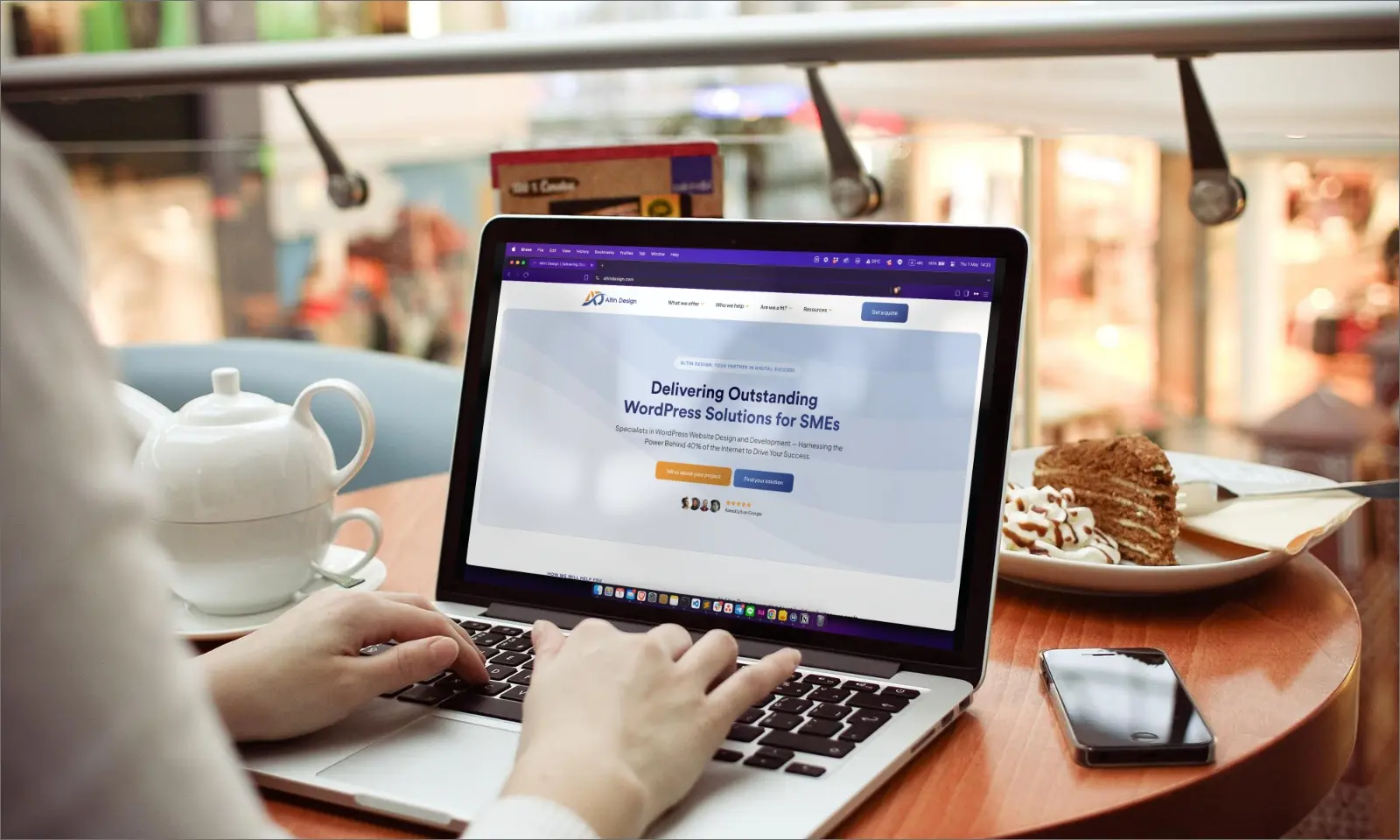Are you an ambitious business owner or entrepreneur aiming to expand your online footprint and boost your revenue? In the realm of contemporary digital marketing, an appealing, meticulously crafted website stands as a cornerstone. It serves as the primary point of contact where potential customers encounter your business, gain insights into your offerings, shape their perceptions, and ultimately make purchases. Yet, the art of web design extends beyond mere aesthetics. It necessitates an interface that seamlessly guides users, ushering them through the sales funnel. In this article, we delve into the pivotal role of web design in successful digital marketing strategies. If you aspire to maintain a competitive edge in today’s digital landscape, read on!
Creating the Digital Front Door
Your website serves as the virtual front door to your business. Just as a physical store must be welcoming, your website should immediately capture the attention and trust of online visitors. Your homepage sets the stage for the entire user experience.
The Role of Visual Appeal
Visual appeal encompasses much more than aesthetics. It involves the strategic use of high-quality images, a harmonious color scheme, and a clear layout that not only pleases the eye but also guides visitors through your content seamlessly.
The Art of Messaging
Crafting compelling messaging on your homepage is key to conveying your brand’s value proposition. It’s about showcasing what sets your products or services apart, addressing pain points, and connecting with your target audience.
Building Trust Through Design
Design elements such as trust badges, customer reviews, and a visibly secure connection help reassure visitors that your website is a safe and credible source of information or products.
Navigating the User Experience (UX)
User experience (UX) encompasses a broad spectrum of considerations. It’s the holistic approach to design that takes into account every interaction a user has with your site, from the moment they land to their final action.
Intuitive Navigation
Navigation should be intuitive and user-friendly. A well-structured menu, clear links, and a logical flow guide visitors effortlessly to the information or products they seek.
Responsive Design
Responsive design ensures that your website looks and functions seamlessly across various devices and screen sizes. It’s about providing a consistent and delightful experience, whether users are on a desktop computer or a smartphone.
Content Hierarchy
A well-planned content hierarchy ensures that essential information is easily accessible. It’s about organizing your content so that users can quickly find what they’re looking for, reducing bounce rates, and keeping visitors engaged.
Load Time Optimization
The speed at which your site loads significantly impacts UX. Optimizing images, using efficient code, and implementing content delivery networks (CDNs) are strategies to ensure fast load times, which is vital for retaining user interest.
The Significance of Mobile-First Design
The mobile imperative is undeniable, with a majority of users accessing websites via smartphones and tablets. Adopting a mobile-first design approach is essential to meet the expectations of these users.
Responsive Design for Mobile Devices
Responsive design isn’t just an option; it’s a necessity. Ensuring that your website adapts seamlessly to mobile devices is vital for user satisfaction and search engine rankings. Mobile users should experience the same quality and ease of navigation as desktop users.
Touch-Friendly Elements
Mobile users navigate via touch. Ensuring that buttons and links are appropriately sized and spaced for touch screens enhances mobile UX, making interactions smooth and frustration-free.
Performance on Limited Bandwidth
Optimizing for mobile also means considering users on slower connections. Lightweight design elements and reduced data usage contribute to a positive mobile experience, ensuring that your website is accessible to a broader audience.
Building Brand Identity
Your website isn’t just a platform for information; it’s an extension of your brand. Building and reinforcing your brand identity is crucial for establishing trust and recognition.
Consistency Across Touchpoints
Consistency in design, messaging, and tone across your website and other digital touchpoints helps establish a memorable and trustworthy brand image. Users should immediately recognize your brand, whether they’re on your website, social media, or receiving an email.
Visual Branding
Visual elements, such as logos, color schemes, and typography, should reflect and reinforce your brand’s identity. These elements play a vital role in conveying your brand’s personality and values.
Storytelling Through Design
Using design to tell your brand’s story can create an emotional connection with users, enhancing brand loyalty and engagement. It’s about weaving your brand narrative into the very fabric of your website, creating a compelling and memorable experience.
Harnessing the SEO Advantage
Search Engine Optimization (SEO) is the cornerstone of digital marketing success. Effective website design goes hand-in-hand with SEO, ensuring that your site is not only visually appealing but also search engine-friendly.
On-Page SEO Elements
On-page SEO elements, such as meta titles, descriptions, and heading tags, should be optimized to improve search engine rankings and click-through rates. These elements are critical for search engines to understand and index your content effectively.
Structured Content
A well-structured website with clear content hierarchies aids search engines in understanding your site’s relevance to user queries. It’s about presenting your content in a way that search engines can easily crawl and categorize.
Image Optimization
Optimizing images through alt tags and proper file sizes not only improves SEO but also enhances load times, which is a crucial factor for both user experience and search engine rankings.
Mobile SEO Considerations
Mobile-friendliness is a significant factor in mobile SEO, as search engines prioritize mobile-responsive websites in mobile search results. Ensuring that your website is optimized for mobile devices is, therefore, a critical aspect of SEO.
Understanding the Importance of Speed
In a world of instant gratification, the speed at which your website loads is critical. Speed significantly impacts user experience, search engine rankings, and overall website performance.
Factors Affecting Load Time
Several factors affect load times, including server performance, page design, and content optimization. Addressing these factors is essential for providing a fast and responsive website.
Optimizing for Speed
Optimizing images, minifying code, and leveraging content delivery networks (CDNs) are strategies to ensure fast load times. These optimizations not only enhance user experience but also contribute to better search engine rankings.
Conversion-Centric Design: Guiding Users Towards Action
Conversion-centric design is the art of creating a user experience that subtly guides visitors towards specific actions, such as signing up, making a purchase, or engaging with content. It’s about strategically shaping user interactions to drive desired outcomes.
The Power of Compelling Call-to-Actions (CTAs)
Crafting persuasive and strategically placed CTAs is at the heart of conversion-centric design. Effective CTAs don’t just scream “Buy Now!” but address user needs and pain points, creating a compelling reason to act. They serve as signposts guiding users along the conversion path.
Designing for User Trust
Trust is the foundation of conversions. A well-designed website exudes credibility through elements like testimonials, trust badges, and clear privacy policies. Users need to feel secure to take action, whether it’s making a purchase or sharing their contact information.
Simplifying Forms for Seamless Conversions
Long, complex forms can be a conversion killer. Conversion-centric design streamlines forms, making them user-friendly and efficient, which can dramatically increase form submissions. It’s about minimizing friction in the conversion process.
Visual Storytelling and Conversion
Engaging visuals that tell a story can captivate users, keeping them on your site longer and increasing the chances of conversion. Visual storytelling builds emotional connections and can be a powerful tool for influencing user behavior.
A/B Testing and Continuous Improvement
Conversion-centric design is an ongoing process. A/B testing allows you to refine design elements based on user behavior, ensuring you’re always optimizing for conversions. It’s about using data-driven insights to make informed design decisions that lead to improved conversion rates.
The Role of Analytics
Comprehensive analytics provide valuable insights into user behavior and conversion paths. Conversion-centric design integrates data analysis to inform design decisions. It’s about leveraging data to continuously refine your website’s design for better conversion rates.
Multichannel Consistency
A consistent design and messaging across multiple digital channels – website, social media, email – ensures a seamless user experience, boosting conversions across the board. It’s about creating a cohesive brand experience that resonates with users regardless of how they interact with your brand.
Conclusion
In conclusion, website design is not just about aesthetics; it’s a multifaceted discipline that includes creating a compelling digital front door, providing an exceptional user experience, embracing mobile responsiveness, building brand identity, harnessing SEO, optimizing speed, and focusing on conversion-centric design. If you’re ready to harness the power of exceptional website design and development services, don’t hesitate to contact us today. Let’s collaborate to craft a website that excels at every level, from user experience to search engine rankings, giving you a commanding edge in the digital landscape.
Ready to elevate your digital presence? Contact us now for expert website design and development services that will supercharge your digital marketing strategy. Let’s turn your online vision into a stunning reality, one that excels at converting visitors into customers!








